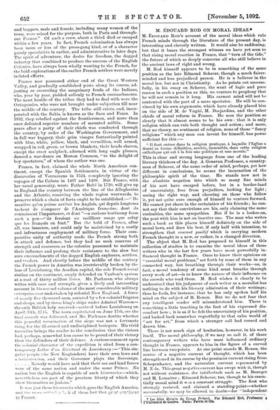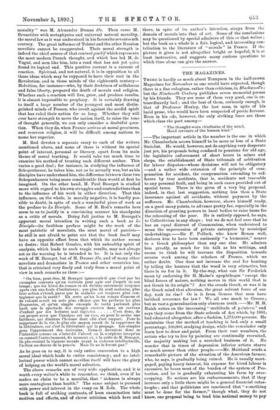M. EDOUARD ROD ON MORAL IDEAS.*
M. EDOUARD ROD'S account of the moral ideas which rule French minds through the literature of the present day, is interesting and cleverly written. It would also be saddening, but that it bears the strongest witness we have yet seen to that rising moral reaction in France, that " turn of the tide," the future of which so deeply concerns all who still believe in the ancient laws of right and wrong.
M. Rod himself appears to be in something of the same position as the late Edmond Scherer, though a much fairer- minded and less prejudiced person. He is a believer in the moral law, but not in Christianity. As he points out success- fully, in his essay on Scherer, the want of logic and pure reason in such a position as this, we venture to prophesy that he will not remain in it long. His earnest mind will not be contented with the part of a mere spectator. He will be con- vinced by his own arguments, which have already placed him on the side of M. de Vogue, M. Desjardins, and the other chiefs of moral reform in France. He sees the position so clearly that it almost seems to be his own : that it is only religion which can rule both thought and action ; and more, that no theory, no sentiment of religion, none of those " fancy religions " which any man can invent for himself, has power sufficient for this :-
" II faut entrer dans la religion pratique, laquelle l'Eglise a donne sa forme definitive, arretee, immuable, dans cette religion catholique qui est a la fois une politique et une morale."
This is clear and strong language from one of the leading literary thinkers of the day. A Genevan Professor, a country- man of Scherer, of the same order of mind, perhaps, yet how different in conclusions, he seems the incarnation of the philosophic spirit of the time. He stands now not in the absolute negation into which so many fine minds of his sort have escaped before, but in a border-land of uncertainty, free from prejudices, looking for light ; seeing the right way, and cheering on those who follow it, yet not quite sure enough of himself to venture forward. He cannot yet share in the certainties of his friends ; he can- not say that their convictions are his, only claiming the same curiosities, the same sympathies. But if he is a looker-on, the post with hint is not an inactive one. The man who writes such a book as this places himself definitely on the side of moral laws, and does his best, if only half with intention, to strengthen that courant positzf which is carrying modern French thought in a new, or rather, in a changed direction. The object that M. Rod has proposed to himself in this collection of studies is to examine the moral ideas of those writers who in the last few years have most powerfully in- fluenced thought in France. Once to know their opinions on " essential moral problems," set forth by none of them in any connected way, but breathing through their works—as, in fact, a moral tendency of some kind must breathe through every work of art—is to know the nature of their influence on the crowds who read them. M. Rod wishes it clearly to be understood that his judgment of each writer as a moralist has nothing to do with his literary admiration of their writings; thus he feels, for instance, that he has only spoken half his mind on the subject of M. Renan. But we do not fear that
any intelligent reader will misunderstand him. There is something a little touching in the fact of his expressed dis- comfort here ; it is as if he felt the uncertainty of his position, and looked back somewhat regretfully to that calm world of "art for art," from which a stronger call had roused and drawn him.
There is not much sign of hesitation, however, in his work
itself. The moral philosophy, if we may so call it, of those contemporary writers who have most influenced ordinary thought in France, appears to him in the figure of a curved line between two points. At one point stands M. Renan, the source of a negative current of thought, which has been strengthened in its course by the pessimist current rising from Schopenhauer, and the naturalist current represented by M. Zola. This great negative current has swept with it, though not without resistance, des intellect eels aueh as M. Bourget and M. Lemaitre ; Edmond Scherer, too, though to his essen- tially moral mind it was a constant struggle. The first who strongly resisted, and claimed a standing-point—whether successfully. we may be allowed to doubt—for "independent • La Ma Morales du Temps Priburnt. Par ildcumul Itud, kruluauur tt nraivereluf 4e Geneve. Pert, Terria et OW morality " was M. Alexandre Dumas Ns. Then came M. Brunetiere with metaphysics and universal natural morality, the moral law as it was understood in his favourite seventeenth century. The great influence of Tolstoi and the other Russian
novelists cannot be exaggerated. Their moral strength is indeed the chief source of that courant poaitif which represents
the most modern French thought, and which has led M. de Vogue, and men like him, into a road that has not yet quite
found its logical end. This positive current is a current of reaction. Spiritual, and not natural, it is in opposition to all those ideas which may be supposed to have their root in the Revolution, and in those minds of the eighteenth century- Helvetius, for instance—who, by their doctrines of selfishness and false liberty, prepared the death of morals and religion. Whether such a reaction will live, grow, and produce results, it is almost impossible to prophesy. It is certainly drawing to itself a large number of the youngest and most distin- guished minds of France, who revolt against the sordid spirit that has ruled their nation for so long. Whether they will ever have strength to move the nation itself, to raise the tone of thought generally, we can only consider a doubtful ques- tion. When they do, when France arrives at moral greatness, and recovers religion, it will be difficult among nations to name her superior.
M. Rod devotes a separate essay to each of the writers mentioned above, and none of these is without its special point of interest, personal or literary, apart from its main theme of moral teaching. It would take too much time to examine his method of treating each different author. This varies a good deal ; for instance, in studying the influence of Schopenhauer, he takes him, not as he actually was, but as his disciples have understood him, the difference between these two Schopenhauers being more considerable than would at first be imagined. On the other hand, M. Paul Bourget is studied more with regard to his own struggles and contradictions than to the influence of his work in either direction. That this
influence, on the whole, is morally negative, it is hardly pos- sible to doubt, in spite of such a wonderful piece of work as the preface to Le Disciple. Some of '31. Rod's remarks here seem to us to justify in a convincing manner his standpoint
as a critic of morals. Doing full justice to M. Bourget's apparent moral intention in writing such a book as Le
Disciple—its faultless preface might be the work of the most patriotic of moralists, the most moral of patriots—
he still is not afraid to point out that the book itself may have an opposite effect from that which its author seems to desire : that Robert Greslou, with his unhealthy spirit of analysis, which leads to such tragic results, may not always act as the warning he is intended to be. It is not only the
work of M. Bourget, but of M. Dumas fils, and of many other novelists and dramatists in France and other countries too, that is criticised very finely and truly from a moral point of view in such remarks as these :— " Ou bien, pent-etre, M. Bourget ignorerait-il que c'est par les exemples concrets qu'un ecrivain peut agir sur l'esprit de son temps ; que lea heros du roman et du theatre entrainent toujours apres eux une foule d'imitateurs ; que plus ils sont malsains, plus leur action s'etend, parce que la maladie ebt toujours plus con- tagiense que la sante ? En sorte qu'un beau roman d'amour et de volonte serait un acte plus efficace que lea prefaces lea plus eloquentes, et qu'un simple exemple de vertu parlerait plus haut que le spectacle des ravages exerces dans un cerveau
d'enfant par des lectures mal digeiees C'est donc, de son propre aveu que l'analyse est un vice, ou pour le moins une faiblesse, qui diminue l'homme dont elle s'est empare. Pour la supprimer de la vie, le plus siar moyen serait de la supprimer de la litterature, car c'est la litterature qui la propage. Les simples gene l'apprennent des ecrivains. Ceux-ci devraient done se l'interdire comme on s'interdit l'alcool ou is morphine lorsqu'on en connait l'entrainement, du moment ou, a Is suite de M. Bourget, ils placeraient la vigueur morale avant la richesse intellectuelle, l'action au-dessus de la pensee. Mais ils ne le feront pas."
As he goes on to say, it is only entire conversion to a high moral ideal which leads to entire consistency ; and no intel- lectual power which cannot sacrifice itself will have the glory of helping on the world's moral salvation.
The above remarks are of very wide application, and it is worth every writer's while to remember, we think, even if he makes no claim to be a moralist., that sickness is always more contagious than health." The same subject is pursued with power and interest in the essay on M. Zola. The whole book is full of striking contrasts, of keen examination into Motives and effects, and of clever criticism which here and
there, in spite of its author's intention, strays from the domain of morals into that of art. Some of the conclusions may be questioned by special admirers of this or that writer ; but the book as a whole is a fair, logical, and interesting con- tribution to the literature of " morals " in France. If the picture it gives is not altogether Might or hopeful, it is at least instructive, and suggests many curious questions to which time alone can give the answer.























































 Previous page
Previous page